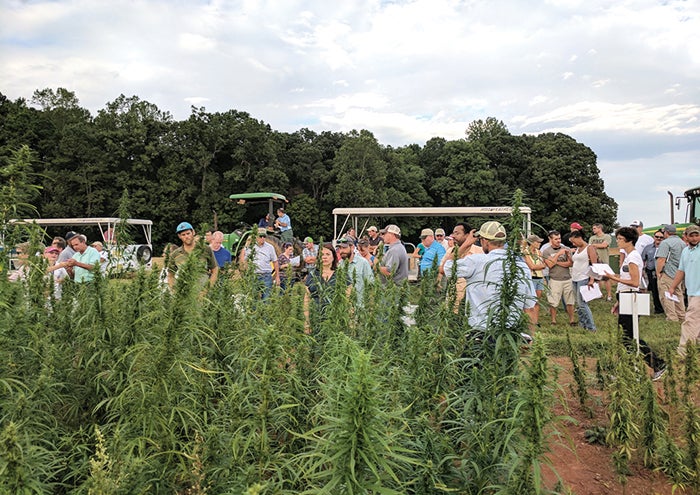North Carolina licensing growers to plant hemp
Published 12:00 am Friday, February 8, 2019

- Submitted photo A Cooperative Extension field day explores hemp growing.
By Amy-Lynn Albertson
Rowan County Extension Director
In December 2018 President Trump signed the Farm Bill. In the bill, industrial hemp was removed from the controlled substance list. This allows more extensive cultivation of hemp and explicitly enables the transfer of hemp-derived products across state lines for commercial or other purposes.
It also puts no restrictions on the sale, transport or possession of hemp-derived products, so long as those items are produced in a manner consistent with the law.
Since 2016, North Carolina has had a pilot research hemp program for industrial hemp. Industrial hemp is not the same as marijuana. Both are cannabis that have been developed through selective breeding for different purposes.
Hemp varieties have been selected for their seed oil and fiber properties and marijuana for its narcotic properties. Cannabis that can be smoked for a high contains more than 10 percent THC. In fact, most marijuana contains 20-30 percent THC. Industrial hemp, by law, must contain less than .3 percent THC.
But it’s the same plant, right? Well yes and no, sweet corn and field corn are the same, but you wouldn’t serve field corn at your church picnic. Through traditional breeding, both have traits that have been selected for their different purposes.
In North Carolina, the NC Industrial Hemp Commission oversees and licenses the growing of industrial hemp. The commission provides oversight and administration of the federal and state laws for growing industrial hemp.
In 2018, N.C. had 6,133 licensed acres, 394 licensed growers and 1.6 million square feet in licensed greenhouse space. Hemp can be raised for seed, fiber or flower (oil extracts). The majority of production in N.C. is focused on growing hemp for the flowers, primarily the CBD market. CBD or cannabidiol is one of over 100 cannabinoids identified in hemp plants. Another cannabinoid is THC, tetrahydrocannabinol, which is the psychoactive ingredient in cannabis.
Growers must report when plants are flowering so they can be tested for THC. Growers must submit samples of their hemp three to five weeks into flowers. If the level of TH is above .3 percent, the crop must be destroyed.
Growers need to be aware that plant stresses like drought, flood, heat or cold can cause a spike in THC. In 2018, 400 hemp samples were tested, and 38 came back above the .3 percent threshold of THC. About 10 percent of the hemp fields are “going hot,” which is a serious risk for a producer to take.
Production costs for growing hemp for CBD are estimated at $13,000 to $15,000 per acre primarily due to the high cost of female clone plants ($5 to $10 per plant with 1,200 to 1,500 plants per acre). The potential gross profit for growing hemp for CBD oils has been reported anywhere from $15,000-$35,000 per acre.
There are still a lot of unknowns about growing the crop, and not everyone is allowed to grow hemp. Only bona fide farmers may apply for a license to grow hemp. This means you must have income from farming that you report on your federal income tax report or a Schedule F.
Rowan and Davidson County Cooperative Extension are hosting an interest meeting for industrial hemp growers on Feb. 22. The meeting will be from 1-4:30 p.m. at the Rowan Agricultural Building, 2727 Old Concord Road.
Experts from N.C. State University will discuss current research and production guidelines. Dr. Tom Melton from NCSU and director of the NC Industrial Hemp Commission will go over the rules and regulations for growing hemp. Processors and buyers will also be available.
There is no cost to this meeting, but registration is required as space is limited. Register online at go.ncsu.edu/industrialhempgrowersinterest2019 or call 704-216-8970. For more information about industrial hemp or any other agricultural topic contact the Rowan County Extension Center at 704-216-8970.



